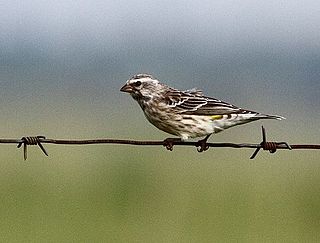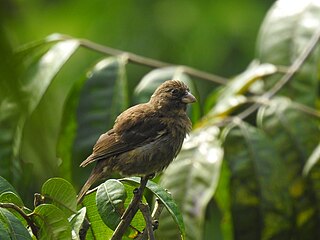
The yellow-fronted canary is a small passerine bird in the finch family. It is sometimes known in aviculture as the green singing finch or the ‘’’green singer’’’.

The yellow canary is a small passerine bird in the true finch family. It is a resident breeder in much of the western and central regions of southern Africa and has been introduced to Ascension and St Helena islands.

The streaky-headed seedeater or streaky-headed canary is a small passerine bird in the finch family. It is an unobtrusive but widespread species in suitable habitats of southern Africa. Its presence in an area is revealed foremost by its callnotes.

The Cape siskin is a small passerine bird in the finch family. It is an endemic resident breeder in the southern Cape Province of South Africa.

The brimstone canary or bully canary is a small passerine bird in the finch family. It is a resident breeder in central and southern Africa.

The Drakensberg siskin is a small passerine bird in the finch family. It is an endemic resident breeder in the eastern Cape Province Transkei and western Natal in South Africa, and in Lesotho.

The white-throated canary is a species of finch in the family Fringillidae.
The Ankober serin is a species of finch in the family Fringillidae. It is a small brown seedeater, about 12 centimeters or 5 inches in length with brown upperparts and its head and breast distinguished with heavy buffy-colored streaking. It is gregarious and is often encountered in flocks. Its song consists of a constant, low twitter.

The black-throated canary, also known as the black-throated seedeater, is a species of finch in the family Fringillidae.

The thick-billed seedeater is a species of finch in the family Fringillidae. It is native to the Western High Plateau and Bioko, the Albertine rift montane forests and the East African montane forests

The lemon-breasted canary, also known as the lemon-breasted seedeater, is a species of finch in the family Fringillidae. It is found in Malawi, Mozambique, South Africa, Zambia, and Zimbabwe. Its natural habitats are dry savannah, subtropical or tropical dry shrubland, and rural gardens.

The yellow-throated seedeater is a species of finch in the family Fringillidae. It is found only in Ethiopia. Its natural habitats are subtropical or tropical dry shrubland and subtropical or tropical dry lowland grassland. It is threatened by habitat loss.

The white-rumped seedeater is a species of finch in the family Fringillidae. It is found throughout the Sahel and the eastern part of the Sudan region. Its natural habitat is dry savanna. It is known elsewhere and in aviculture as the grey singing finch.
The Kipengere seedeater, also known as the Tanzania seedeater, is a species of finch in the family Fringillidae. It is found only in Tanzania specifically in Mbeya Region and Njombe Region. Its natural habitats are subtropical or tropical moist montane forest and subtropical or tropical high-elevation shrubland. It is threatened by habitat loss.

The black-eared seedeater is a species of finch in the family Fringillidae. It is found in Angola, Botswana, Democratic Republic of the Congo, Malawi, Mozambique, Namibia, South Africa, Tanzania, Zambia, and Zimbabwe. Its natural habitats are subtropical or tropical dry forest and dry savanna.

Reichard's seedeater is a species of finch in the family Fringillidae. It is native to the miombo savanna . It is named after the German explorer Paul Reichard.

The Príncipe seedeater is a species of finch in the family Fringillidae. It is found only on the islands of São Tomé and Príncipe off the west coast of Africa. Its natural habitats are subtropical or tropical dry forest and subtropical or tropical moist lowland forest.

The forest canary is a species of finch in the family Fringillidae. It is found in South Africa and Eswatini. Its natural habitats are subtropical or tropical moist lowland forest and subtropical or tropical moist montane forest.

The brown-rumped seedeater is a species of finch in the family Fringillidae. It is native to the Ethiopian Highlands and Karkaar (Somaliland). It is widespread in towns, villages gardens, plantations and upland heath.

Reichenow's seedeater is a species of finch in the family Fringillidae. It is sometimes considered conspecific with the black-throated canary.



















